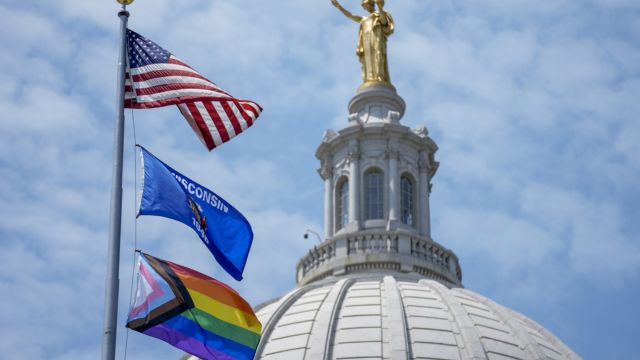Same-sex marriage has been a topic of legal and social debate for decades in the United States, and Wisconsin has played a significant role in this evolving history. While marriage equality is now recognized nationwide, Wisconsin’s path to legalizing same-sex marriage was marked by legal battles, constitutional amendments, and shifting public opinions.
In this article, we’ll explore the history of same-sex marriage laws in Wisconsin, the legal challenges that shaped its status, and what the current laws mean for LGBTQ+ couples in the state.
The Early Legal Landscape
Before nationwide legalization, Wisconsin had a long history of restricting same-sex marriage. In 1979, the state became one of the first in the country to enact a law explicitly banning marriage between same-sex couples. This law remained in place for decades and was reinforced by a constitutional amendment passed in 2006.
2006 Constitutional Amendment
In November 2006, Wisconsin voters approved a constitutional amendment defining marriage as a union between one man and one woman. The amendment, known as the Wisconsin Marriage Protection Amendment, passed with 59% of the vote. This effectively banned same-sex marriage and civil unions in the state, making it more difficult for LGBTQ+ couples to gain legal recognition.
Legal Challenges and the Road to Equality
The ban on same-sex marriage in Wisconsin faced multiple legal challenges over the years, with advocates arguing that it violated equal rights protections. The most significant case that led to a change in the law was Wolf v. Walker.
Wolf v. Walker (2014)
In February 2014, a group of same-sex couples filed a lawsuit challenging Wisconsin’s ban on same-sex marriage. The case, Wolf v. Walker, argued that the ban violated the Equal Protection Clause of the U.S. Constitution. In June 2014, U.S. District Judge Barbara Crabb ruled that Wisconsin’s same-sex marriage ban was unconstitutional, effectively striking down the prohibition.
Following the ruling, county clerks across the state began issuing marriage licenses to same-sex couples. However, the state government, led by then-Governor Scott Walker and Attorney General J.B. Van Hollen, sought to appeal the decision. The Seventh Circuit Court of Appeals upheld Judge Crabb’s ruling in September 2014, affirming that Wisconsin’s ban was unconstitutional.
Nationwide Legalization: Obergefell v. Hodges (2015)
While same-sex marriage became legal in Wisconsin in 2014, full marriage equality was not recognized across the country until the landmark Supreme Court case Obergefell v. Hodges in June 2015. This decision made same-sex marriage legal in all 50 states, including Wisconsin, and rendered any remaining state bans unenforceable.
Since the Obergefell ruling, same-sex couples in Wisconsin have had the same marriage rights as opposite-sex couples, including the ability to adopt children, file joint taxes, and access spousal benefits such as healthcare and inheritance rights.
Current Status of Same-Sex Marriage in Wisconsin
As of today, same-sex marriage remains fully legal in Wisconsin and is protected under federal law. However, some concerns persist about the potential for future challenges at the state or national level.
Threats to Marriage Equality
Although the Obergefell decision made same-sex marriage the law of the land, there have been ongoing debates about whether a future Supreme Court ruling or congressional action could reverse or weaken marriage equality protections. In response to these concerns, President Joe Biden signed the Respect for Marriage Act in December 2022, which ensures federal recognition of same-sex marriages regardless of any potential changes to Supreme Court rulings.
State-Level Protections
Despite the federal protections, Wisconsin’s 2006 constitutional amendment banning same-sex marriage technically remains in place, though it is unenforceable. Some advocates argue that the state should repeal the amendment to remove any lingering legal uncertainties. However, legislative action to remove the ban has yet to gain traction in Wisconsin’s Republican-controlled legislature.
The Impact of Legalization on Wisconsin’s LGBTQ+ Community
The legalization of same-sex marriage has had profound effects on LGBTQ+ couples and families in Wisconsin. It has provided them with legal stability, financial benefits, and social recognition. Many same-sex couples have taken advantage of these rights by getting married, adopting children, and building their lives without fear of legal discrimination.
Despite these advances, LGBTQ+ individuals in Wisconsin still face challenges in areas such as workplace discrimination, healthcare access, and social acceptance, particularly in more conservative regions of the state. Advocacy groups continue to push for broader protections to ensure equal rights for all residents.
Conclusion
Same-sex marriage is legal in Wisconsin, thanks to a combination of federal court rulings and the Supreme Court’s decision in Obergefell v. Hodges. While the state’s old constitutional ban remains on the books, it is no longer enforceable. Marriage equality has brought significant benefits to Wisconsin’s LGBTQ+ community, but ongoing efforts are needed to protect and expand these rights in the face of potential legal and political challenges. As the landscape of LGBTQ+ rights continues to evolve, staying informed and engaged remains crucial for those who support equality.









